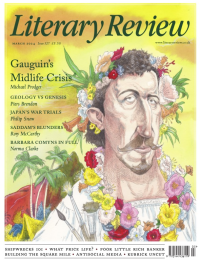George Cochrane
Night & Day
How to Be Somebody Else
By Miranda Pountney
Jonathan Cape 278pp £16.99
You can become somebody else quite easily if you don’t agonise over it. At the start of Miranda Pountney’s debut novel, Dylan is a 37-year-old Brit leading a high-flying life as an advertising executive in New York. Twenty pages later and ‘with no real forethought’, she’s chucked in the job, given up her apartment and become a house-sitter in order to pursue her writing. But has she become somebody she likes?
She hasn’t told her long-distance boyfriend what she’s done, or her family and friends. And when she strikes up an affair with the married jazz pianist in the apartment below, the layers of deceit accumulate. But Pountney doesn’t judge her protagonist. To marry, have children, hold down a job, be a feminist role model: the expectations on women in their thirties, as presented, would be enough to send anyone running. And the sex with Gabe, the pianist, is the best Dylan’s ever had. The problem is Gabe himself. Entitled and controlling, he robs Dylan of her newly won freedom and distracts her from what she won them for: to be a writer. Now she has no idea who she is.
Abrupt transitions between scenes and a fragmentary prose style keep readers in a similar state of disorientation. But we are never totally lost. Where literal sense breaks down, a kind of linguistic sense takes over, and Pountney’s running gags (about celebrities as fish – ‘Goldie Prawn’), telling use of repeated

Sign Up to our newsletter
Receive free articles, highlights from the archive, news, details of prizes, and much more.@Lit_Review
Follow Literary Review on Twitter
Twitter Feed
The era of dollar dominance might be coming to an end. But if not the dollar, which currency will be the backbone of the global economic system?
@HowardJDavies weighs up the alternatives.
Howard Davies - Greenbacks Down, First Editions Up
Howard Davies: Greenbacks Down, First Editions Up - Our Dollar, Your Problem: An Insider’s View of Seven Turbulent...
literaryreview.co.uk
Johannes Gutenberg cut corners at every turn when putting together his bible. How, then, did his creation achieve such renown?
@JosephHone_ investigates.
Joseph Hone - Start the Presses!
Joseph Hone: Start the Presses! - Johannes Gutenberg: A Biography in Books by Eric Marshall White
literaryreview.co.uk
Convinced of her own brilliance, Gertrude Stein wished to be ‘as popular as Gilbert and Sullivan’ and laboured tirelessly to ensure that her celebrity would outlive her.
@sophieolive examines the real Stein.
Sophie Oliver - The Once & Future Genius
Sophie Oliver: The Once & Future Genius - Gertrude Stein: An Afterlife by Francesca Wade
literaryreview.co.uk